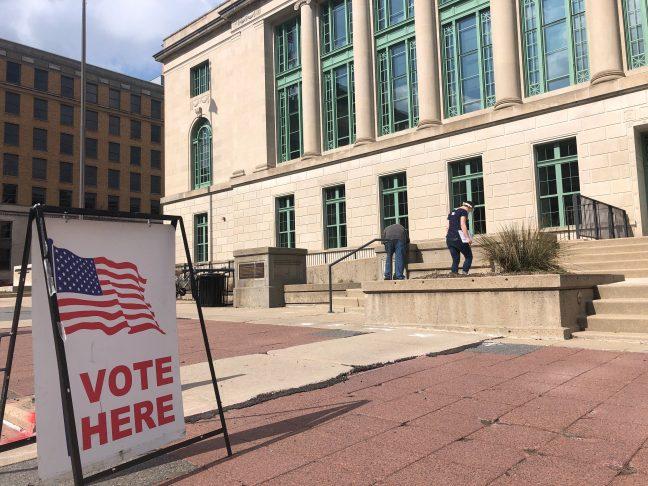Voting is a necessity for anyone who is able to in this country. To vote is a civic duty entrusted to the people to advocate for their own democracy. Yet, the two main choices we are faced with this November give many Americans little hope for this nation’s future. This leaves disgruntled Americans with two options — either don’t vote or look for a third-party candidate. With the current state of American politics, and our election system for that matter, both staying at home and voting third-party does little to no good for the nation as a whole.
With a close 4-3 ruling from the Wisconsin Supreme Court, the state’s judiciary has formally decided to close off the ballot to the ever-popular Green Party for this November election. This decision, coming Sept. 14, was a mere seven weeks away from election day, saving an abundance of concern for political figures and election officials across the state. Though the Green Party has recently pursued legal action against this decision, the state judiciary decided to halt absentee ballot mailing for several days before sending out ballots to those who requested them.
Similarly, pseudo-candidate Kanye West tried to make his mark on Wisconsin voters by entering the election as a third-party candidate, but his request was also denied. Though the Green Party is one of the largest third parties in the nation and West’s candidacy gained a lot of attention over the summer, election officials are more worried about voter turnout for the two main parties rather than Green Party and West constituents in Wisconsin.
For West, his approval to get onto the ballot was ultimately denied. West is a “celebrity” candidate, similar to President Donald Trump’s candidacy in 2016, but his campaign for this election has shown to be extremely superficial. But voters in this day and age have shown to limit their understanding of a singular candidate’s values, and focus more on the two main parties’ running points.
As Wisconsin is considered a “swing state,” many voters have undoubtedly yet to choose their presidential-elect, and West could have taken some of the swing votes away. West could have also unknowingly persuaded some of these voters to refrain from voting this November, as he is yet another reminder that the choices for this election do not excite many. This is the last thing the two main parties of Wisconsin need in the mid-pandemic U.S., as controversy created over absentee voting by our sitting president has induced unwarranted doubt in the logistics of our electoral system.
Mass delays of absentee ballots are not good for any state’s electoral system, and the pandemic has made registering to vote even harder. According to the Wisconsin Elections Commission, there were 3,496,198 registered voters Sept. 1, 2016, but just 3,476,347 registered voters Sept. 1 of this year. This near-20,000 voter registration drop in four years of data collection is close to Trump’s 22,748 vote win over Hillary Clinton in Wisconsin in 2016. If this is all it could take for our sitting president to win the state of Wisconsin again, there should definitely be more of a push by the Democratic Party to get potential voters more excited to get to the polls or vote absentee.
While the only reason a citizen should need to vote for a candidate is strong agreement with their running points, our winner-take-all election process makes this concept unrealistic. Instead, citizens have multiple reasons to contemplate before making their decision. Not only is it “will this candidate represent my political beliefs to the best of their ability?” but also “does this candidate even have a chance at winning this election?”
This is a result of the decline of third-party politics, where the chances of a third-party candidate having a chance at winning a presidential election are slim to none. The Green Party and West are both feeling the effects of this decline, as instead of having a legitimate chance of winning, realistically they are only taking away votes from one or both of the main candidates. This is a sad reality for American politics, as we have moved away from a purely representative election.
In the context of the election, third-party votes are essentially worthless, as they are placed for a contender with no legitimate chance at winning. Alternatively, for the voter placing this vote, their strength to stay with a party or candidate purely for their stances on our national issues is admirable. Instead of transferring their political ideology to one of the main parties, like most Americans have done, they stayed with their specific party and continued to support them, regardless of their electoral wins or losses. Yet, this admiration is not enough to overcome the boundary our first-to-270 electoral system sets into place.
With this current system, we as a democracy need to adapt our own political aspirations to focus on Democratic and Republican candidates. This is largely in an effort to make a vote mean something, as both of these party’s catch-all political strategies capture more voters, which therefore makes these parties more likely to win an election.
Regardless of the party affiliation, all Americans should vote. In 2016, about 58.1% of the voter-eligible population voted. While some people may have special circumstances prohibiting them from getting to the polls, there are several services that have been created to assist people with transportation, including Uber and Lyft. Yet, those needing accommodations do not make up the proportion of people who did not vote.
This pandemic has brought an immense amount of pressure and stress to us all in an already stressful election year. We as Americans need to adapt to this stress and continue on with events that keep this country close to the democracy it was founded upon. The most simple way to do this takes just 10 minutes to register, and a few more minutes to cast your ballot. Vote.
Ethan Wollins (wollins@wisc.edu) is a freshman majoring in political science.


